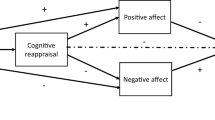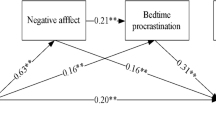Abstract
Background
Bedtime procrastination (BP), a special type of health behavior procrastination, is considered to be a failure of self-control. Notably, self-control may mediate the effect of trait anxiety on general procrastination. However, there is no evidence demonstrating the role of self-control in the relationship between trait anxiety and BP. Moreover, the association between BP and trait anxiety has not yet been thoroughly studied. Therefore, the present study aimed to explore the direct relationship between them as well as the mediating role of self-control in this relationship.
Methods
This cross-sectional survey included 718 college students enrolled in Chinese universities between October 2018 and January 2020. The Chinese versions of the Bedtime Procrastination Scale, the Self-Control Scale, and the Trait Anxiety Inventory were used to evaluate BP, self-control, and trait anxiety, respectively.
Results
Multiple linear regression analysis revealed trait anxiety independently predicted BP while controlling for demographic characteristics. Correlation analyses showed that BP was positively correlated with trait anxiety, but negatively related to self-control. Structural equation modeling further revealed a mediating role of self-control in the relationship between trait anxiety and BP.
Conclusions
Trait anxiety is a significant independent predictor of BP and may induce BP directly or indirectly through the effect of self-control. These findings provide a deeper understanding of the relationship between trait anxiety and BP and the underlying mechanism by exploring the mediating effect of self-control. As such, trait anxiety and self-control should be included in prevention and intervention strategies to address BP behavior in college students.

Similar content being viewed by others
References
Merikanto I, Partonen T. Increase in eveningness and insufficient sleep among adults in population-based cross-sections from 2007 to 2017. Sleep Med. 2020;75:368–79. https://doi.org/10.1016/j.sleep.2020.07.046.
Kroese FM, de Ridder DTD, Evers C, Adriaanse MA. Bedtime procrastination: introducing a new area of procrastination. Front Psychol. 2014;5:611. https://doi.org/10.3389/fpsyg.2014.00611.
Kadzikowska-Wrzosek R. Insufficient sleep among adolescents: the role of bedtime procrastination, chronotype and autonomous vs. controlled motivational regulations. Curr Psychol. 2020;39(2):1-10. https://doi.org/10.1007/s12144-018-9825-7.
Herzog-Krzywoszanska R, Krzywoszanski L. Bedtime procrastination, sleep-related behaviors, and demographic factors in an online survey on a Polish sample. Front Neurosci. 2019;13:963. https://doi.org/10.3389/fnins.2019.00963.
Zhao Y, Meng D, Ma X, et al. Examining the relationship between bedtime procrastination and personality traits in Chinese college students: the mediating role of self-regulation skills. J Am Col Health. 2022. https://doi.org/10.1080/07448481.2022.2038179.
Eysenck HJ. The structure of human personality. 3rd ed. London: Methuen; 1970.
Zhang R, Chen Z, Hu B, Zhou F, Feng T. The anxiety-specific hippocampus-prefrontal cortex pathways links to procrastination through self-control. Hum Brain Mapp. 2022;43(5):1738–48. https://doi.org/10.1002/hbm.25754.
Shan HB, Zhang LY, Wei M, Xin YJ, Quan SA, Li Y. Mediating effect of self-control on relationship between procrastination and anxiety in college students. Chin Ment Health J. 2016;30(8):624–8. https://doi.org/10.3969/j.issn.1000-6729.2016.08.012.
Kroese FM, Evers C, Adriaanse MA, de Ridder DTD. Bedtime procrastination: a self-regulation perspective on sleep insufficiency in the general population. J Health Psychol. 2016;21(5):853–62. https://doi.org/10.1177/1359105314540014.
Kamphorst B, Nauts S, de Ridder DTD, Anderson J. Too depleted to turn in: the relevance of end-of-the-day resource depletion for reducing bedtime procrastination. Front Psychol. 2018;9:252. https://doi.org/10.3389/fpsyg.2018.00252.
Kadzikowska-Wrzosek R. Self-regulation and bedtime procrastination: the role of self-regulation skills and chronology. Pers Indiv Differ. 2018;128(1):10–5. https://doi.org/10.1016/j.paid.2018.02.015.
Cattell RB, Scheier IH. The nature of anxiety: a review of thirteen multivariate analyses comprising 814 variables. Psychol Rep. 1958;4(3):351–88. https://doi.org/10.2466/pr0.1958.4.3.351.
Spielberger CD, Gorsuch RL, Lushene RE. Manual for the State-Trait Anxiety Inventory. CA: Consulting Psychologists Press; 1970.
Rubin R. Matters of the mind–bedtime procrastination, relaxation-induced anxiety, lonely tweeters. JAMA. 2020;323(1):15–6. https://doi.org/10.1001/jama.2019.20014.
Chung SJ, An H, Suh S. What do people do before going to bed? A study of bedtime procrastination using time use surveys. Sleep. 2020;43(4):zsz267. https://doi.org/10.1093/sleep/zsz267.
Geng Y, Gu J, Wang J, Zhang R. Smartphone addiction and depression, anxiety: the role of bedtime procrastination and self-control. J Affect Disord. 2021;293:415–21. https://doi.org/10.1016/j.jad.2021.06.062.
Spielberger CD, Pollans CH, Worden TJ. Anxiety disorders. In: Turner SM, Hersen M, editors. Adult psychopathology and diagnosis. New York: John Wiley and Sons; 1984. p. 263–303.
Weger M, Sandi C. High anxiety trait: a vulnerable phenotype for stress-induced depression. Neurosci Biobehav Rev. 2018;87:27–37. https://doi.org/10.1016/j.neubiorev.2018.01.012.
Herzog-Krzywoszanska R, Jewula B, Krzywoszanski L. Bedtime procrastination partially mediates the impact of personality characteristics on daytime fatigue resulting from sleep deficiency. Front Neurosci. 2021;15:727440. https://doi.org/10.3389/fnins.2021.727440.
Tangney JP, Baumeister RF, Boone AL. High self-control predicts good adjustment, less pathology, better grades, and interpersonal success. J Pers. 2004;72(2):271–324. https://doi.org/10.1111/j.0022-3506.2004.00263.x.
Hagger M, Gucciardi D, Turrell A, Hamilton K. Self-control and health-related behaviour: the role of implicit self-control, trait self-control, and lay beliefs in self-control. Br J Health Psychol. 2019;24(4):764–86. https://doi.org/10.1111/bjhp.12378.
Friese M, Frankenbach J, Job V, Loschelder D. Does self-control training improve self-control? A meta-analysis. Perspect Psychol Sci. 2016;12(6):1077–99. https://doi.org/10.1177/1745691617697076.
Sirois F, Pychyl T. Procrastination and the priority of short-term mood regulation: consequences for future self. Soc Personal Psychol Compass. 2013;7(2):115–27. https://doi.org/10.1111/spc3.12011.
Gökalp Z, Saritepeci M, Durak H. The relationship between self-control and procrastination among adolescent: the mediating role of multi screen addiction. Curr Psychol. 2022:1-12. https://doi.org/10.1007/s12144-021-02472-2.
Bernecker K, Job V. Too exhausted to go to bed: implicit theories about willpower and stress predict bedtime procrastination. Br J Psychol. 2020;111(1):126–47. https://doi.org/10.1111/bjop.12382.
Sirois FM, Nauts S, Molnar DS. Self-compassion and bedtime procrastination: an emotion regulation perspective. Mindfulness. 2019;10(10):434–45. https://doi.org/10.1007/s12671-018-0983-3.
Eysenck M, Derakshan N, Santos R, Calvo M. Anxiety and cognitive performance: attentional control theory. Emotion. 2007;7(2):336–53. https://doi.org/10.1037/1528-3542.7.2.336.
Sugimoto D, Slick N, Mendel D, et al. Meditation monologue can reduce clinical injection-related anxiety: randomized controlled trial. J Evid Based Integr Med. 2021;26:2515690X211006031. https://doi.org/10.1177/2515690x211006031.
Garcia-Gonzalez J, Ventura-Miranda M, Requena-Mullor M, Parron-Carreño T, Alarcon-Rodriguez R. State-trait anxiety levels during pregnancy and foetal parameters following intervention with music therapy. J Affect Disord. 2018;232:17–22. https://doi.org/10.1016/j.jad.2018.02.008.
Khalsa M, Greiner-Ferris J, Hofmann S, Khalsa S. Yoga-enhanced cognitive behavioural therapy (Y-CBT) for anxiety management: a pilot study. Clin Psychol Psychother. 2015;22(4):364–71. https://doi.org/10.1002/cpp.1902.
Ma X, Meng D, Zhu L, et al. Bedtime procrastination predicts the prevalence and severity of poor sleep quality of Chinese undergraduate students. J Am Coll Health. 2020:1-8. https://doi.org/10.1080/07448481.2020.1785474.
Zhu L, Meng D, Ma X, Guo J, Mu L. Sleep timing and hygiene practices of high bedtime procrastinators: a direct observational study. Fam Pract. 2020;37(6):779–84. https://doi.org/10.1093/fampra/cmaa079.
Ma X, Zhu L, Guo J, Zhao Y, Fu Y, Mu L. Reliability and validity of the Bedtime Procrastination Scale in Chinese college students. Chin J Clin Psychol. 2021;29(04):717–20. https://doi.org/10.16128/j.cnki.1005-3611.2021.04.011.
Tan S, Guo Y. Revision of Self-Control Scale for Chinese college students. Chin J Clin Psychol. 2008;16(5):468–70.
Li W, Qian M. Revision of the State-Trait Anxiety Inventory with sample of Chinese college students. Acta Sci Natur Univ Pekinensis. 1995;31(1):108–14. https://doi.org/10.13209/j.0479-8023.1995.014.
Kim H. Statistical notes for clinical researchers: assessing normal distribution (2) using skewness and kurtosis. Restor Dent Endod. 2013;38(1):52–4. https://doi.org/10.5395/rde.2013.38.1.52.
Hu Lt, Bentler PM. Cutoff criteria for fit indexes in covariance structure analysis: conventional criteria versus new alternatives. Struct Equ Modeling. 1999;6(1):1-55. https://doi.org/10.1080/10705519909540118.
Carlos M, Elena B, Teresa I. Are adherence to the mediterranean diet, emotional eating, alcohol intake, and anxiety related in university students in Spain? Nutrients. 2020;12(8):2224. https://doi.org/10.3390/nu12082224.
Segalas C, Labad J, Salvat-Pujol N, et al. Sleep disturbances in obsessive-compulsive disorder: influence of depression symptoms and trait anxiety. BMC Psychiatry. 2021;21(1):42. https://doi.org/10.1186/s12888-021-03038-z.
Zhang R, Chen Z, Xu T, Zhang L, Feng T. The overlapping region in right hippocampus accounting for the link between trait anxiety and procrastination. Neuropsychologia. 2020;146:107571. https://doi.org/10.1016/j.neuropsychologia.2020.107571.
Hintsanen M, Puttonen S, Smith K, et al. Five-factor personality traits and sleep: evidence from two population-based cohort studies. Health Psychol. 2014;33(10):1214–23. https://doi.org/10.1037/hea0000105.
Allen MS, Magee CA, Vella SA. Personality, hedonic balance and the quality and quantity of sleep in adulthood. Psychol Health. 2016;31(9):1091–107. https://doi.org/10.1080/08870446.2016.1178745.
Norbury R, Evans S. Time to think: subjective sleep quality, trait anxiety and university start time. Psychiatry Res. 2019;271:214–9. https://doi.org/10.1016/j.psychres.2018.11.054.
Spielman AJ, Caruso LS, Glovinsky PB. A behavioral perspective on insomnia treatment. Psychiatr Clin North Am. 1987;10(4):541–53. https://doi.org/10.1016/S0193-953X(18)30532-X.
Horvath A, Montana X, Lanquart JP, et al. Effects of state and trait anxiety on sleep structure: a polysomnographic study in 1083 subjects. Psychiatry Res. 2016;244:279–83. https://doi.org/10.1016/j.psychres.2016.03.001.
Schacter D, Benoit R, Szpunar K. Episodic future thinking: mechanisms and functions. Curr Opin Behav Sci. 2017;17:41–50. https://doi.org/10.1016/j.cobeha.2017.06.002.
Exelmans L, Van den Bulck J. “Glued to the tube”: the interplay between self-control, evening television viewing, and bedtime procrastination. Commun Res. 2017;48(4):594–616. https://doi.org/10.1177/0093650216686877.
Zhang MX, Wu AMS. Effects of smartphone addiction on sleep quality among Chinese university students: the mediating role of self-regulation and bedtime procrastination. Addict Behav. 2020;111:106552. https://doi.org/10.1016/j.addbeh.2020.106552.
Byrd-Bredbenner C, Eck K. Relationships among executive function, cognitive load, and weight-related behaviors in university students. Am J Health Behav. 2020;44(5):691–703. https://doi.org/10.5993/ajhb.44.5.12.
Valshtein T, Oettingen G, Gollwitzer P. Using mental contrasting with implementation intentions to reduce bedtime procrastination: two randomised trials. Psychol Health. 2020;35(3):275–301. https://doi.org/10.1080/08870446.2019.1652753.
Funding
This work was supported by the National Natural Science Foundation of China (No. 31800924).
Author information
Authors and Affiliations
Corresponding authors
Ethics declarations
Ethical Approval
All procedures performed in studies involving human participants were in accordance with the ethical standards of the institutional and/or national research committee and with the 1964 Helsinki declaration and its later amendments or comparable ethical standards.
Informed Consent
Informed consent was obtained from all individual participants included in the study.
Conflict of Interest
The authors declare no competing interests.
Additional information
Publisher's Note
Springer Nature remains neutral with regard to jurisdictional claims in published maps and institutional affiliations.
Supplementary Information
Below is the link to the electronic supplementary material.
Rights and permissions
About this article
Cite this article
Zhang, C., Meng, D., Zhu, L. et al. The Effect of Trait Anxiety on Bedtime Procrastination: the Mediating Role of Self-Control. Int.J. Behav. Med. 30, 260–267 (2023). https://doi.org/10.1007/s12529-022-10089-3
Accepted:
Published:
Issue Date:
DOI: https://doi.org/10.1007/s12529-022-10089-3




